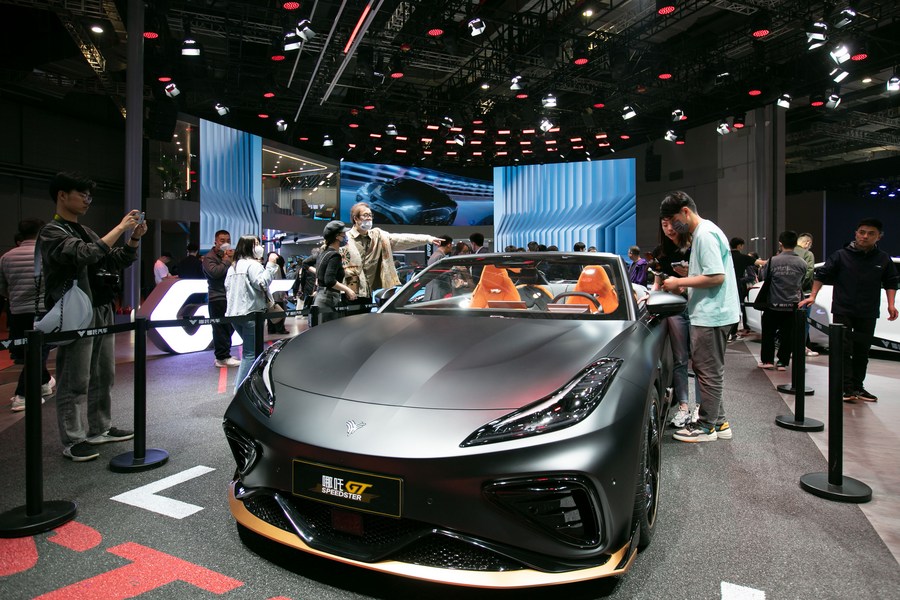More Chinese carmakers set sights on European market

People look at a NETA GT Speedster on display during the 20th Shanghai International Automobile Industry Exhibition, also known as Auto Shanghai 2023, in Shanghai, April 25, 2023. (Xinhua/Wang Xiang)
SHANGHAI, April 27 (Xinhua) -- More Chinese carmakers are no longer satisfied with the existing markets including Southeast Asia and Latin America, and have now set their sights on the European market.
At the ongoing exhibition of Auto Shanghai 2023, emerging Chinese automobile brands such as ZEEKR, NETA and HiPhi announced their plans to go to Europe, which is dominated by established global auto giants.
ZEEKR, an electric vehicle (EV) brand of Chinese automotive giant Geely, unveiled its ambitious global growth strategy at the auto show. Its first vehicles for Europe will debut in Sweden and the Netherlands this year.
Spiros Fotinos, CEO of ZEEKR Europe, said the company will enter most of Western Europe by 2026, and aims to become a leading brand in the EV market in Europe by 2030.
"European consumers are increasingly ready to make the shift to EVs and are more open than ever to new technology brands -- especially ones purely focused on electric vehicles," Fotinos said, adding that ZEEKR is well positioned to offer world-class EVs, innovative services and an exceptional experience.
Ahead of the auto show, the company launched its third product, ZEEKR X, which is more suitable for customers in Europe. By the end of March, ZEEKR had already delivered more than 93,000 units.
"The development of overseas markets requires products first, with elements such as market planning, product definition, channel preparation and localization planning coming after," said Zhang Yong, CEO of NETA.
NETA has established a subsidiary in Europe, and it is preparing for its car models, including the NETA S and NETA GT, to enter the European market.
"We will start selling in Europe in the first quarter of next year. I expect the local market to give us some surprises. I think we have a chance in the European market with the competitiveness of our products," Zhang said.
HiPhi, a Chinese luxury pure-electric brand, said it will begin in Munich and Oslo, with two models expected to go on sale in Europe in the third quarter of this year.
At Auto Shanghai 2023, a large number of foreign businesspeople can be seen inquiring and negotiating at the booths of Chinese auto brands. Yuan Wenbo, a partner at global consultancy firm Roland Berger, said that more and more auto companies from Europe, ASEAN, the Middle East and the Americas have taken note of the huge opportunities to cooperate with Chinese carmakers. They can understand the technology and products of Chinese brands through the auto show, and can at the same time connect with their own local resources.
In 2022, China exported over 3.11 million vehicles, overtaking Germany to become the world's second-largest auto exporter. The trend continued in the first quarter of this year, with China exporting more than 990,000 cars, up 70.6 percent year on year.
China's auto exports have increased by almost 1 million units a year over the past two years, due to improved competitiveness in the country's supply chain, quality, technology and brands.
The year 2021 was a turning point for Chinese cars going global. Before 2021, China exported around 1 million cars overseas annually, relying mostly on low-priced exports and focusing on the Southeast Asian market. After 2021, with years of experience accumulated in the field of new energy, Chinese automobile enterprises saw greater product competitiveness and more of them entered the markets of developed countries.
An Conghui, CEO of ZEEKR Intelligent Technology, said that Chinese new energy vehicles should go overseas with a more confident attitude and an accelerated pace of expansion. Participation in international competition will help them unleash their innovative vitality further, An added.


